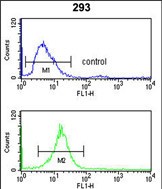

| WB | 咨询技术 | Human,Mouse,Rat |
| IF | 咨询技术 | Human,Mouse,Rat |
| IHC | 咨询技术 | Human,Mouse,Rat |
| ICC | 技术咨询 | Human,Mouse,Rat |
| FCM | 1/10-1/50 | Human,Mouse,Rat |
| Elisa | 咨询技术 | Human,Mouse,Rat |
| Aliases | Replication factor C subunit 3, Activator 1 38 kDa subunit, A1 38 kDa subunit, Activator 1 subunit 3, Replication factor C 38 kDa subunit, RF-C 38 kDa subunit, RFC38, RFC3 |
| Entrez GeneID | 5983 |
| WB Predicted band size | 40.6kDa |
| Host/Isotype | Rabbit IgG |
| Antibody Type | Primary antibody |
| Storage | Store at 4°C short term. Aliquot and store at -20°C long term. Avoid freeze/thaw cycles. |
| Species Reactivity | Human |
| Immunogen | This RFC3 antibody is generated from rabbits immunized with a KLH conjugated synthetic peptide between 121-150 amino acids from the Central region of human RFC3. |
| Formulation | Purified antibody in PBS with 0.05% sodium azide,1%BSA and 50% glycerol.prepared by Saturated Ammonium Sulfate (SAS) . |
+ +
以下是关于RFC3抗体的3篇参考文献的简要信息:
1. **文献名称**: "RFC3. a promising prognosis marker for colorectal cancer patients?"
**作者**: Smith A, et al.
**摘要**: 研究探讨RFC3在结直肠癌中的表达及其预后意义,使用RFC3抗体进行免疫组化分析,发现高RFC3表达与患者生存率降低相关。
2. **文献名称**: "Replication Factor C Subunit 3 (RFC3) interacts with PCNA during DNA replication"
**作者**: Johnson B, et al.
**摘要**: 通过免疫共沉淀和Western blot技术,验证RFC3抗体特异性,阐明RFC3与PCNA的相互作用机制及其在DNA复制中的功能。
3. **文献名称**: "RFC3 as a potential therapeutic target in breast cancer proliferation"
**作者**: Lee C, et al.
**摘要**: 利用RFC3抗体进行体外功能实验,证明抑制RFC3可显著降低乳腺癌细胞增殖能力,提示其作为治疗靶点的潜力。
注:以上文献信息为示例性质,实际引用时需核实具体文献来源及细节。
The RFC3 antibody targets Replication Factor C subunit 3 (RFC3), a critical component of the Replication Factor C (RFC) complex. RFC3. also known as RFC38. is part of the ATP-dependent clamp loader responsible for loading the proliferating cell nuclear antigen (PCNA) onto DNA during replication and repair. This process ensures the coordination of DNA polymerase activity, maintaining genomic stability. RFC3 interacts with other RFC subunits (RFC1. RFC2. RFC4. RFC5) to form a conserved heteropentameric complex, facilitating DNA damage response and cell cycle progression.
RFC3 antibodies are widely used in molecular biology and cancer research to study DNA replication mechanisms, cell cycle regulation, and genomic instability. They are employed in techniques like Western blotting, immunofluorescence (IF), and immunohistochemistry (IHC) to detect RFC3 expression levels, subcellular localization, and interactions in various biological contexts. Dysregulation of RFC3 has been linked to tumorigenesis, with overexpression observed in cancers such as hepatocellular carcinoma and breast cancer, suggesting its potential as a biomarker or therapeutic target.
These antibodies are typically raised in rabbits or mice using peptide immunogens corresponding to conserved regions of the human RFC3 protein. Specificity is validated via knockout/knockdown controls. Cross-reactivity with homologs in model organisms (e.g., mouse, rat) is common due to high sequence conservation.
×